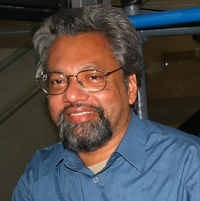
Do Christ followers have a mission in, to, and alongside the university? Yes. Is the university a global mission worth significant investment of time, resources, and energy? Yes. How do we embrace, engage, and give voice to the university mission?
Recently I listened to the 2012 Henry Martyn Lectures, delivered by Dr Vinoth Ramachandra. Ramachandra‘s overall topic is Mission as Prophetic Engagement. Lecture 1 focuses upon Engaging the University. As you may already know, Ramachandra serves on the International Fellowship of Evangelical Students (IFES) Senior Leadership Team as Secretary for Dialogue & Social Engagement. There is much to consider in this excellent lecture, so much so that I’m creating a series with this post as a teaser. Please join me in listening to and dialoguing with Ramachandra‘s call to Engaging the University.
I’ve been trying to bring about this paradigm shift so that we [IFES] think not of ourselves as an evangelistic ministry to students, but we are a mission to the university and the university includes professors, researchers, and administrators . . .. [and] those extended social practices that we call academic disciplines.
How do we engage Christianly with those social practices? How do we have a Christian voice within those [social practices]? So it is much more than giving a courses on apologetics or evangelism, but helping Christian students, PhD students, post-doc students, lecturers, professors to think and live Christianly as a community of Christian scholars. That’s the paradigm shift, it’s slowly beginning in some countries, a lot of resistance in this country [United Kingdom], unfortunately I don’t know why. — Question and Answer in Part 3
I think we help Christian students . . . have a historical perspective on their discipline . . . we also keep talking about what’s going on in the world and how their particular discipline meshes with what is happening globally on the current scene. Not just politics, but the whole global religious scene, the economics system within which we live. How do they locate their particular academic discipline within that bigger canvas? And so we must expose them to some general talks or some books which will just enlarge their general knowledge and let them go from there . . . [by] self-learning.
Most of the things I’m writing and speaking on are not things I learned in the university. But I’ve had to educate myself and I do that because of my passion to communicate Christ . . . to all areas of life. So I think that without that passion it’s very hard to see such people emerging. And we need to be praying that there will be people inspired by the Holy Spirit with that passion to truly communicate Christ in this kind of world in which we live where everything is interconnected. So it’s said that just when everything’s becoming more and more connected, and I’ll speak about this more in my third lecture, that we have this growing fragmentation and people getting narrower and narrower even in theology. . . .
Theology’s too important to be left to theologians. Theology has to be given to the proverbial man or woman in the pew and I think that if you’re listening to the issues that they’re facing in their neighborhoods, their places of work, you will change your theology. It will become practical whatever it is. It can be historical theology, but you’re relating historical theology to the contemporary issues that people are wrestling with from Monday to Friday. So I think that there needs to be a place where in every city where you have academic theologians meeting together with say scientists, with people in political philosophy, in the arts, in the media, just meeting together on a regular basis to talk together. And I think that’s the way theology is done. People meeting, talking, reflecting on their experiences and then consulting Scripture and the Christian tradition to find resources that will equip them and enlarge their vision. Now that needs to be happening more. To me that is the real theological education that I would like to see, whether or not you get people a degree at the end of it. That’s not important. . . . — Question and Answer in Part 4
Amen! As part of InterVarsity Christian Fellowship/USA’s vision To see students and faculty transformed, campuses renewed, and world changers developed, the Emerging Scholars Network (ESN) is called to identify, encourage, and equip the next generation of Christian scholars who will be a redeeming influence within higher education. We rejoice in your interaction with this call and ask for your continued prayer/recommendations as we explore/take next steps with you as part of the larger community of Christian scholars, crossing the boundaries of time, geography, disciplines, gender, ethnicity, etc. . . . To God be the glory!
Tom enjoys daily conversations regarding living out the Biblical Story with his wife Theresa and their four girls, around the block, at Elizabethtown Brethren in Christ Church (where he teaches adult electives and co-leads a small group), among healthcare professionals as the Northeast Regional Director for the Christian Medical & Dental Associations (CMDA), and in higher ed as a volunteer with the Emerging Scholars Network (ESN). For a number of years, the Christian Medical Society / CMDA at Penn State College of Medicine was the hub of his ministry with CMDA. Note: Tom served with InterVarsity Christian Fellowship / USA for 20+ years, including 6+ years as the Associate Director of ESN. He has written for the ESN blog from its launch in August 2008. He has studied Biology (B.S.), Higher Education (M.A.), Spiritual Direction (Certificate), Spiritual Formation (M.A.R.), Ministry to Emerging Generations (D.Min.). To God be the glory!

Leave a Reply